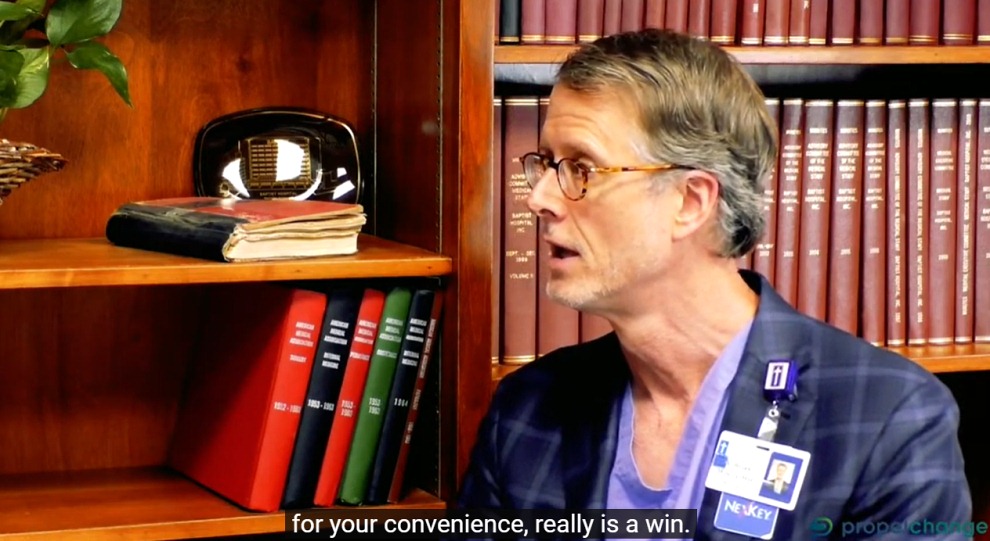In today’s video, we’re talking with Doctor Brian Wilcox about obsessive customer service. Doctor Wilcox is the Chief Physician Executive at Saint Thomas Heart, as well as, a cardiac and thoracic surgeon. You hear a lot of horror stories about healthcare and patient issues, but what you’re going to hear today is so much different than that. Which is why we ask him to be our guest for obsessive customer service.
TRANSCRIPT
DONNA: So, Doctor Wilcox, we have such a fun story.
DR. WILCOX: Brian, please.
DONNA: Okay, thank you.
DR. WILCOX: Yeah, there you go.
DONNA: So there’s one of the big differences.
DR. WILCOX: It is, that’s right.
DONNA: So we have such a fun story, Brian, to tell. And it has been amazing to be able to say to people; you’re not gonna believe how this all happened. So I wanna tell everybody a little bit about what happened and then kinda pick your brain about how do you get people to do what you have done for us.
DR. WILCOX: Sure, glad to talk.
DONNA: So, basically, my husband had open heart surgery, which you know. It was a shock when we were told he was gonna have open heart surgery. And so the first thing that we do is we get on the phone with a couple of friends, or send emails actually, to a couple of friends said, “Alright so, Saint Thomas, who would you recommend “cause that’s who we need to talk to.”
DR. WILCOX: Sure, and then I got a call, couple emails, and a call and then I reached out to you and your husband if I remember correctly.
DONNA: Yep and it was here’s my information. So that was the first big, really? Here is all my information including my cell phone. Please contact me so that we can talk about this.
DR. WILCOX: Well and I think being accessible is one of the cornerstones of being a successful provider of care now. So access is really now, through a myriad of platforms, whether it’s your phone or it’s your computer, or it’s a handshake, or it’s a pass, or it’s a comrade or a friend’s referral, so, however, we’re connected to patients is the way we try to establish relationships and meet them. And so, I think our relationship started by email, but it quickly transitioned into a couple phone calls on a Friday night if I remember.
DONNA: It was, it was, and I remember you apologizing! I’m so sorry to bother you on Friday night. Wha-hut? Please bother us! This is a big deal!
DR. WILCOX: Well and I think what you just touched on is really important in patient care which is to that patient, that family, whatever they’re dealing with is the most important thing in their world at the moment. And when we see hundreds or thousands of patients over a year, it’s easy to forget that. So if you stay on job which is that patient in that moment is job one, the most important thing in their life. It makes it a lot easier to call Friday night or Saturday morning to say “Okay I know makes it a lot easier to call Friday night or Saturday morning to say, Okay, I know you’re worried, “let’s talk, what can I do to help.”
DONNA: I think the second part of after those phone calls on that Friday night, the second part that was so amazing, out of three, was on Easter Sunday again you called. We were actually in the stable working, and you called again, apologized for bothering us on Easter Sunday. So, bother us! This is a big deal! And you were at that point gave us, here’s my recommendation for who I would have do your surgery cause he had been on vacation. You had to talk to him first.
DR. WILCOX: Yeah, in fact, my partner who did your husband’s surgery was out of town, he was in New York. I called him in New York, explained the situation, and asked him to be able and willing to step in and see you quickly when he got in town. Of course, like me, he was glad to do so. So, I made that connection and then reconnected to you and your husband.
DONNA: Right.
DR. WILCOX: So my job was really as a facilitator, but in a larger sense, is to really create that culture of access and willingness and promptness that we think really is a patient care win.
DONNA: So the third part of that, that was such an amazing piece to us was as I explained to you, I’m goin’ out of town, I have a speaking engagement. I can cancel it if I need to. But you know, is there anything we could do? And you had already talked to him and told him about that. So he worked us in before he actually started surgeries two days later.
DR. WILCOX: Well that’s right. I called my partner, I said, “I know your schedule’s busy, “but I’ve got a couple that I really want you to meet. “that I think you’ll be glad to meet and take care of. “Let’s see if we can bump the schedule.” So he talked to his office manager. He and the office manager moved you to the head of the line. I think you came in at seven in the morning which is an o hour. He didn’t have office that week or that day. And you came in, you met him, made surgical plans, and I think he went to surgery the next week. Fortunately, the concern over his condition didn’t mean he needed an immediate operation.
DONNA: Right, right.
DR. WILCOX: But your concern is understandable, and that’s our job as providers, as physicians and surgeons, is to say okay, I sense your anxiety. I know you’re concerned. This is real, it’s not a three-alarm re emergency, but let’s put a plan together that’ll reassure you and allow you to relax for a few days before we move the actual surgical plan forward.
DONNA: Yes, and I just want you to know, everybody I tell this, it’s just amazing. They just, their mouths drop open. They just can’t believe anybody would go to all of that trouble, even knowing that this is a big life-threatening kind of issue. So here’s what I really want to know. How do you impart that obsessive customer service that you do so incredibly well into everybody on your staff and all the docs at this hospital? What do you do?
DR. WILCOX: Well, you start by staying on message, which is, just say yes. So it may not be that I can solve your particular problem, but I have expressed a willingness that I’m gonna take your problem, make it my own. And organizationally, we have 68 surgeons and cardiologists in our practice and virtually to a man and woman; we believe that our job is to facilitate patient care success stories. Just like your husband’s. So we all give out our digital access points, our phone numbers, our email address. And our phone numbers are on our business cards. And we all have very defined schedules and hours, but what we all, I think, share is this willingness to blow up the schedule and accommodate the reality of an urgent or even just an anxiety-provoking situation like your husband has. Now like any organization, there’s gaps in how we do this. And one of my leadership responsibilities, I think is to remind my partners and our team that this is job one. If we say yes, as I mentioned to you earlier, you may need your baby delivered, and I’m not the guy to do it, but I know I can find somebody in as quickly a time as I did for your husband to deliver your babies. So in care, I think, that’s a really reassuring maybe quality or value, that we can offer patients. And I think it distinguishes us, frankly, from some of the competitors we have in our space.
DONNA: Because we could go a lot of places for the same type of surgery.
DR. WILCOX: Well, that’s right. And nationally, Nashville is well-regarded medically, but locally, we’re in a place where there’s really a lot of great healthcare. Nobody is finding themselves where they can’t get what they need, so how you distinguish yourselves? I think you do it by your culture of quality, which is a given we think, but we push hard for quality. And you do it with access and with customer care service which as a patient is just a sense of empathy, compassion, and then frankly, timeliness; like your husband’s experience.
DONNA: Well, thank you, because I think any organization, any organization, could take that same information and say, if we apply these three principles, we’d be better.
– I think you’re right. I think in healthcare which is such an important part of anybody’s life, the fact that whoever’s caring for you is willing to do it at almost at their inconvenience for your convenience, really is a win. And so, we think organizationally, this is the right way to be.
DONNA: Well thank you so much for sharing with us how you have, how you show up in terms of what we saw, it’s amazing.
DR. WILCOX: It’s our pleasure. I’m glad your husband’s doing great.
DONNA: He’s doing great, we appreciate you.
DR. WILCOX: Certainly.
So now that you have heard how obsessive customer service works in healthcare. Ask yourself a couple of questions.
In our organization, what do we do for obsessive customer service? And is it all of us? Or is it just one or two people who that’s their job?
WE LOVE YOUR FEEDBACK
We love your feedback. We’ve been getting great feedback on LinkedIn and in emails, so if you have a topic that you’d like us to discuss, or if you have questions, please send us an email. We would love to hear from you.
TAGS: company culture, corporate leadership, customer service, employee management, executive leadership, Nashville business, Nashville business leadership

